-
 bitcoin
bitcoin $87959.907984 USD
1.34% -
 ethereum
ethereum $2920.497338 USD
3.04% -
 tether
tether $0.999775 USD
0.00% -
 xrp
xrp $2.237324 USD
8.12% -
 bnb
bnb $860.243768 USD
0.90% -
 solana
solana $138.089498 USD
5.43% -
 usd-coin
usd-coin $0.999807 USD
0.01% -
 tron
tron $0.272801 USD
-1.53% -
 dogecoin
dogecoin $0.150904 USD
2.96% -
 cardano
cardano $0.421635 USD
1.97% -
 hyperliquid
hyperliquid $32.152445 USD
2.23% -
 bitcoin-cash
bitcoin-cash $533.301069 USD
-1.94% -
 chainlink
chainlink $12.953417 USD
2.68% -
 unus-sed-leo
unus-sed-leo $9.535951 USD
0.73% -
 zcash
zcash $521.483386 USD
-2.87%
Which investors are suitable for Bitcoin ETFs? Risk preference and capital threshold analysis
Bitcoin ETFs offer regulated, accessible exposure to Bitcoin without the need for crypto wallets, making them ideal for investors seeking diversification with a high-risk, high-reward asset.
Jun 13, 2025 at 09:56 pm
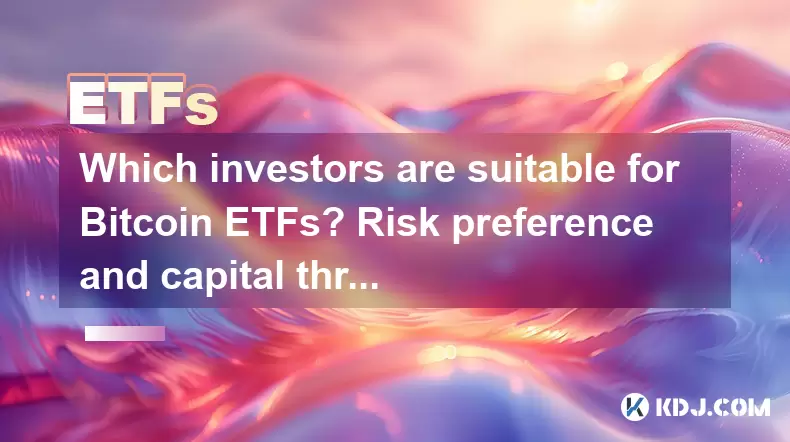
Understanding Bitcoin ETFs and Their Market Position
Bitcoin Exchange-Traded Funds (ETFs) are financial instruments that track the price of Bitcoin while being traded on traditional stock exchanges. These funds offer investors a way to gain exposure to Bitcoin without directly owning or managing digital assets. The main advantage of Bitcoin ETFs lies in their accessibility, as they can be purchased through standard brokerage accounts, eliminating the need for crypto wallets or blockchain knowledge.
The structure of these ETFs typically involves holding Bitcoin or Bitcoin futures contracts, depending on the fund's strategy. This distinction is crucial because it affects how closely the ETF mirrors the actual spot price of Bitcoin. Investors should understand whether the ETF they're considering tracks the physical asset or derivatives, as this impacts performance and volatility.
Who Should Consider Investing in Bitcoin ETFs?
Bitcoin ETFs are particularly appealing to investors who seek exposure to cryptocurrency markets but lack the technical expertise or desire to manage digital wallets and private keys. They also suit those who prefer regulated investment vehicles over direct crypto trading on decentralized or semi-regulated platforms.
Institutional investors often favor Bitcoin ETFs due to their integration into existing portfolio structures and compliance with regulatory frameworks. Retail investors with access to brokerage accounts may also find these products attractive, especially if they are already familiar with ETF mechanics from other asset classes like equities or commodities.
Risk Profile: Matching Investor Tolerance with Bitcoin ETF Characteristics
Investing in Bitcoin ETFs carries inherent risks, primarily stemming from the volatility of Bitcoin itself. The price of Bitcoin can experience significant fluctuations within short timeframes, which translates directly into ETF value changes. Therefore, only investors comfortable with high levels of risk should consider allocating capital to these instruments.
Moreover, Bitcoin ETFs may include leverage or tracking errors, especially those based on futures contracts rather than physical holdings. Such complexities can amplify losses beyond the initial investment or deviate from expected returns. It’s essential for potential investors to review the prospectus and understand the specific risks associated with each ETF before committing funds.
Capital Thresholds and Accessibility Factors
One of the key benefits of Bitcoin ETFs is their low entry barrier compared to purchasing actual Bitcoin. Since ETF shares can be bought in fractional amounts, even small investors can participate without needing to acquire an entire Bitcoin, which can be prohibitively expensive.
Brokerage platforms offering these ETFs usually require no minimum account balances, further enhancing accessibility. However, transaction fees and management expenses vary by provider and ETF structure, so investors should compare costs across options. Additionally, tax implications differ between jurisdictions, and consulting a financial advisor may be necessary to optimize after-tax returns.
Diversification Benefits and Portfolio Allocation Strategies
For investors aiming to diversify beyond traditional asset classes, Bitcoin ETFs provide an avenue to incorporate non-correlated assets into their portfolios. While Bitcoin has shown some correlation with equity markets during macroeconomic events, its behavior remains distinct enough to offer diversification benefits.
Strategic allocation depends on individual goals and risk appetite. Conservative investors might limit exposure to 1–2% of their portfolio, whereas more aggressive ones could allocate up to 5–10%. Regular rebalancing is advisable to maintain target allocations, given the volatile nature of the underlying asset.
Regulatory Environment and Its Impact on Eligibility
The availability of Bitcoin ETFs varies significantly by region due to differing regulatory stances. In the U.S., the SEC has approved certain types of Bitcoin ETFs—particularly those based on futures—while delaying decisions on physically-backed versions. This creates a landscape where investor eligibility hinges on jurisdiction and product type.
In contrast, countries like Canada and Germany have embraced broader categories of crypto ETFs, allowing local investors greater flexibility. International investors must verify whether their brokers support access to these products and whether there are residency restrictions in place.
- Check regional regulations before investing.
- Verify broker compatibility with desired ETFs.
- Understand tax obligations related to gains and dividends.
Frequently Asked Questions
Can I invest in Bitcoin ETFs through my retirement account?Yes, many brokerage platforms allow Bitcoin ETFs to be held in IRAs or 401(k)s, subject to custodian approval. However, not all providers support these assets, so it’s important to confirm with your plan administrator.
Do Bitcoin ETFs pay dividends?No, Bitcoin ETFs do not generate dividend income since Bitcoin does not produce cash flow. Any distributions are typically derived from interest earned on collateral or other investments held by the ETF.
Are Bitcoin ETFs safer than buying Bitcoin directly?They offer different risk profiles. ETFs eliminate custody risks but introduce counterparty and tracking risks. Direct ownership avoids third-party dependencies but requires secure storage solutions.
How do expense ratios affect long-term returns in Bitcoin ETFs?Expense ratios reduce net returns annually. For example, a 0.75% fee on a $10,000 investment costs $75 per year, which compounds over time and impacts overall profitability.
Disclaimer:info@kdj.com
The information provided is not trading advice. kdj.com does not assume any responsibility for any investments made based on the information provided in this article. Cryptocurrencies are highly volatile and it is highly recommended that you invest with caution after thorough research!
If you believe that the content used on this website infringes your copyright, please contact us immediately (info@kdj.com) and we will delete it promptly.
- GeeFi Unleashes Game-Changing Staking with Up to 55% High-Yield APR for GEE Holders
- 2025-12-21 09:35:02
- Fiji's Currency Gets a Fresh Look: New Polymer Designs and Enhanced Circulation
- 2025-12-21 06:55:01
- Cathie Wood's Ark Invest Adjusts Tesla Investment, Eyes Crypto Opportunities
- 2025-12-21 06:45:02
- Navigating the New Frontier: Crypto Tax Bill, Stablecoins, and De Minimis Rules Take Center Stage
- 2025-12-21 03:35:01
- COIN's Compass: Coinbase Stock Market Performance Charting New Territories Amidst Evolving Crypto Landscape
- 2025-12-20 12:45:01
- GeeFi Rockets Towards 100x Returns, While Ripple Makes Strategic Stablecoin Moves
- 2025-12-20 06:15:02
Related knowledge
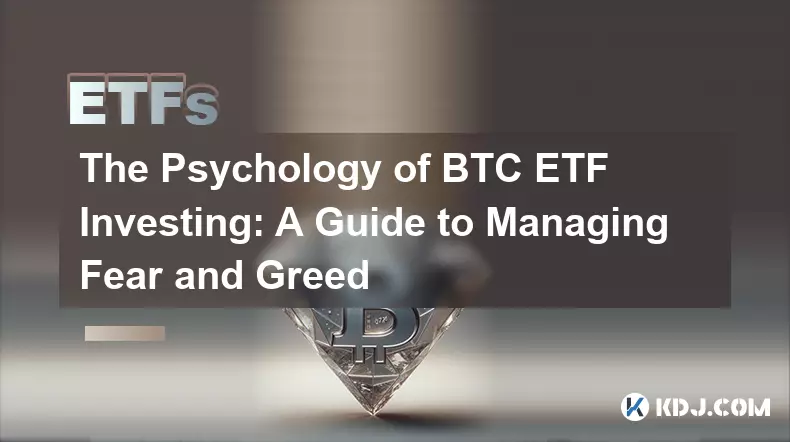
The Psychology of BTC ETF Investing: A Guide to Managing Fear and Greed
Nov 05,2025 at 03:44am
The Emotional Triggers Behind Bitcoin ETF Investment Decisions1. Investors often react impulsively when they see sudden spikes in Bitcoin ETF inflows,...

Is Your BTC ETF Insured?: A Guide to SIPC and Custodian Protections
Nov 05,2025 at 01:20pm
Understanding BTC ETFs and Investor Protection1. Bitcoin exchange-traded funds (ETFs) have introduced a new layer of accessibility for traditional inv...

BTC ETF Performance Tracking: Tools and Tips for Monitoring Your Investment
Nov 01,2025 at 07:19am
BTC ETF Performance Tracking: Essential Tools1. Utilizing financial data platforms like Bloomberg, Yahoo Finance, and CoinDesk provides real-time upda...
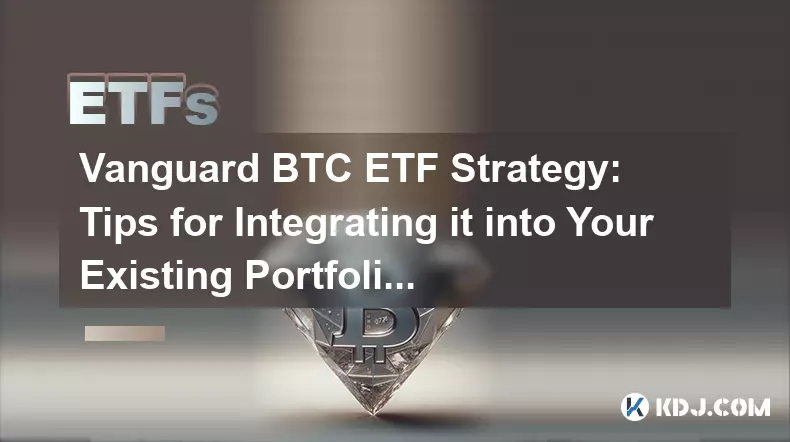
Vanguard BTC ETF Strategy: Tips for Integrating it into Your Existing Portfolio
Nov 03,2025 at 02:00pm
Vanguard BTC ETF Strategy: Key Considerations for Portfolio Integration1. The introduction of a Vanguard Bitcoin ETF strategy marks a pivotal shift in...
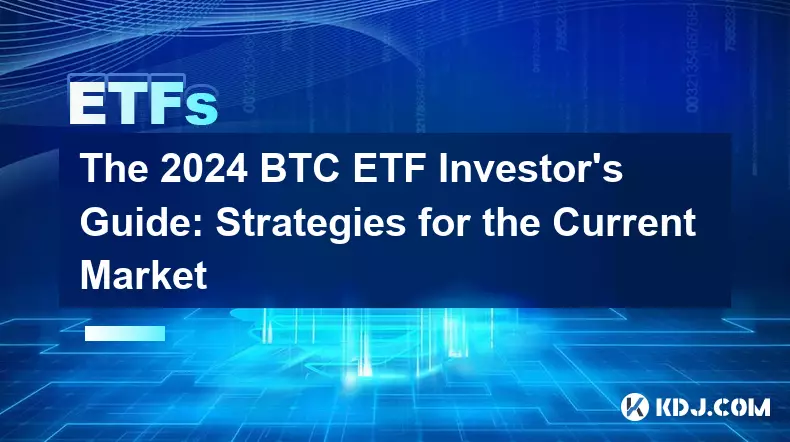
The 2024 BTC ETF Investor's Guide: Strategies for the Current Market
Nov 04,2025 at 08:39pm
The 2024 BTC ETF Investor's Guide: Strategies for the Current Market 1. The introduction of Bitcoin exchange-traded funds (ETFs) in 2024 has fundament...
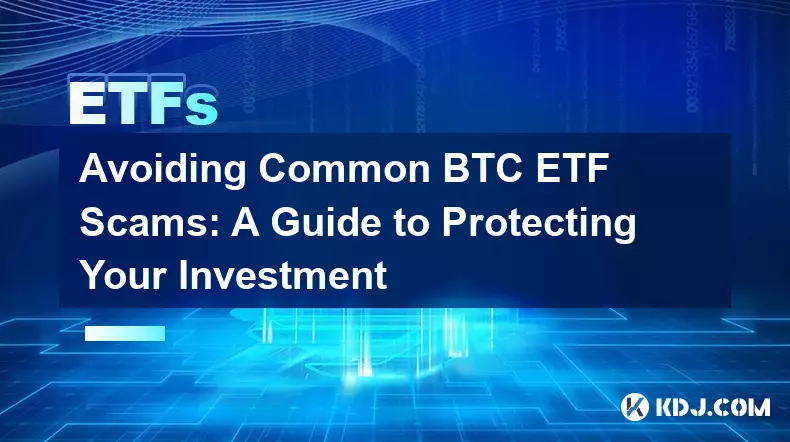
Avoiding Common BTC ETF Scams: A Guide to Protecting Your Investment
Nov 05,2025 at 10:45am
Emerging Trends in the Cryptocurrency Market1. Decentralized finance (DeFi) platforms continue to reshape how users interact with digital assets, offe...

The Psychology of BTC ETF Investing: A Guide to Managing Fear and Greed
Nov 05,2025 at 03:44am
The Emotional Triggers Behind Bitcoin ETF Investment Decisions1. Investors often react impulsively when they see sudden spikes in Bitcoin ETF inflows,...

Is Your BTC ETF Insured?: A Guide to SIPC and Custodian Protections
Nov 05,2025 at 01:20pm
Understanding BTC ETFs and Investor Protection1. Bitcoin exchange-traded funds (ETFs) have introduced a new layer of accessibility for traditional inv...

BTC ETF Performance Tracking: Tools and Tips for Monitoring Your Investment
Nov 01,2025 at 07:19am
BTC ETF Performance Tracking: Essential Tools1. Utilizing financial data platforms like Bloomberg, Yahoo Finance, and CoinDesk provides real-time upda...

Vanguard BTC ETF Strategy: Tips for Integrating it into Your Existing Portfolio
Nov 03,2025 at 02:00pm
Vanguard BTC ETF Strategy: Key Considerations for Portfolio Integration1. The introduction of a Vanguard Bitcoin ETF strategy marks a pivotal shift in...

The 2024 BTC ETF Investor's Guide: Strategies for the Current Market
Nov 04,2025 at 08:39pm
The 2024 BTC ETF Investor's Guide: Strategies for the Current Market 1. The introduction of Bitcoin exchange-traded funds (ETFs) in 2024 has fundament...

Avoiding Common BTC ETF Scams: A Guide to Protecting Your Investment
Nov 05,2025 at 10:45am
Emerging Trends in the Cryptocurrency Market1. Decentralized finance (DeFi) platforms continue to reshape how users interact with digital assets, offe...
See all articles









































































